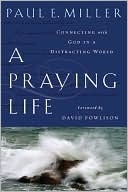More on this book
Community
Kindle Notes & Highlights
We are so busy that when we slow down to pray, we find it uncomfortable. We prize accomplishments, production. But prayer is nothing but talking to God.
Because we can do life without God, praying seems nice but unnecessary. Money can do what prayer does, and it is quicker and less time-consuming. Our trust in ourselves and in our talents makes us structurally independent of God. As a result, exhortations to pray don’t stick.
If we love people and have the power to help, then we are going to be busy. Learning to pray doesn’t offer us a less busy life; it offers us a less busy heart.
As Anthony Bloom, a Greek Orthodox writer said, “Abandon all, you will receive heaven.”2 When you give God your life, he gives you the gift of himself.”
The only way to come to God is by taking off any spiritual mask. The real you has to meet the real God. He is a person.
If you are not praying, then you are quietly confident that time, money, and talent are all you need in life. You’ll always be a little too tired, a little too busy. But if, like Jesus, you realize you can’t do life on your own, then no matter how busy, no matter how tired you are, you will find the time to pray.
Regardless of how or when you pray, if you give God the space, he will touch your soul. God knows you are exhausted, but at the same time he longs to be part of your life. A feast awaits.
We look at the inadequacy of our praying and give up, thinking something is wrong with us. God looks at the adequacy of his Son and delights in our sloppy, meandering prayers.
We don’t need self-discipline to pray continuously; we just need to be poor in spirit.
The issue of power—the ability to make a difference, to change something—is at the heart of asking.
God is a person, and his universe reflects his personhood. The closer something is to the character of God, the more it reflects him and the less it can be measured. Things such as integrity, beauty, hope, and love are all in the same category as prayer. You can tell their presence and even describe them, but you can’t define them, simply because they are too close to God’s image.
Now Jesus taps you on the shoulder and says, “Stop judging. When you see someone else’s sin, instead of using that information to correct them, use that information to humble yourself by first finding the beam in your own eye.” Instead of using your insights into other people’s issues as a spiritual hammer, Jesus wants you to take these insights and deepen your own repentance (7:1-5).
At the center of self-will is me, carving a world in my image, but at the center of prayer is God, carving me in his Son’s image.
It never occurs to Sue that God might want her to take out the trash for the rest of her life, because to do so would mean she is letting her husband take advantage of her. But isn’t Jesus endlessly taking out the church’s trash?
Baloney. This is my Father’s world. Everything you do in Vegas is connected to the rest of your life. Everything you do is connected to who you are as a person and, in turn, creates the person you are becoming. Everything you do affects those you love. All of life is covenant.
Imbedded in the idea of prayer is a richly textured view of the world where all of life is organized around invisible bonds or covenants that knit us together. Instead of a fixed world, we live in our Father’s world, a world built for divine relationships between people where, because of the Good News, tragedies become comedies and hope is born.
We need the sharp-edged, absolute character of the Word and the intuitive, personal leading of the Spirit. The Word provides the structure, the vocabulary. The Spirit personalizes it to our life. Keeping the Word and the Spirit together guards us from the danger of God-talk becoming a cover for our own desires and the danger of lives isolated from God.
We live in many overlapping stories, most of which are larger than us. Each of us will die with unfinished stories. We can never forget that God is God. Ultimately it is his story, not ours.


